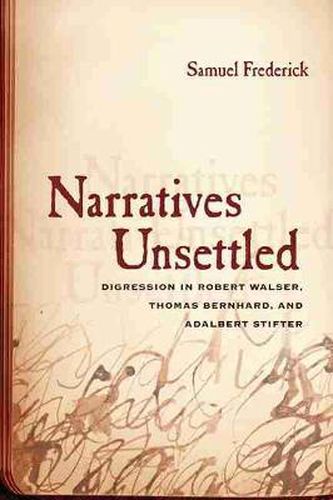Readings Newsletter
Become a Readings Member to make your shopping experience even easier.
Sign in or sign up for free!
You’re not far away from qualifying for FREE standard shipping within Australia
You’ve qualified for FREE standard shipping within Australia
The cart is loading…






In Narratives Unsettled, Samuel Frederick proposes a new conception of narrativity that can accommodate unwieldy, recalcitrant forms of digression. By way of close readings of three distinct German-language writers, Frederick demonstrates that digression, far from being a non- or anti-narrative interruption, contributes to what makes these writers’ works fundamentally narrative. The author thus counters several basic assumptions of classical narratology, including the belief-rooted in Aristotle-that a narrative without a plot is a logical impossibility, and that anything deviating from a narrative’s purposeful whole is either destructive or insignificant. Frederick’s readings of the narrative experiments, utopian moments, and obsessions with the trivial in the works of Walser, Bernhard, and Stifter point to new ways of approaching the ostensibly anti-narrative as a productive element of narrativity. As a work that explores the often neglected crossroads of German studies and postclassical narratology, Narratives Unsettled will be of great interest to scholars in both of these fields, as well as to those working on literature and theory in general.
$9.00 standard shipping within Australia
FREE standard shipping within Australia for orders over $100.00
Express & International shipping calculated at checkout
In Narratives Unsettled, Samuel Frederick proposes a new conception of narrativity that can accommodate unwieldy, recalcitrant forms of digression. By way of close readings of three distinct German-language writers, Frederick demonstrates that digression, far from being a non- or anti-narrative interruption, contributes to what makes these writers’ works fundamentally narrative. The author thus counters several basic assumptions of classical narratology, including the belief-rooted in Aristotle-that a narrative without a plot is a logical impossibility, and that anything deviating from a narrative’s purposeful whole is either destructive or insignificant. Frederick’s readings of the narrative experiments, utopian moments, and obsessions with the trivial in the works of Walser, Bernhard, and Stifter point to new ways of approaching the ostensibly anti-narrative as a productive element of narrativity. As a work that explores the often neglected crossroads of German studies and postclassical narratology, Narratives Unsettled will be of great interest to scholars in both of these fields, as well as to those working on literature and theory in general.